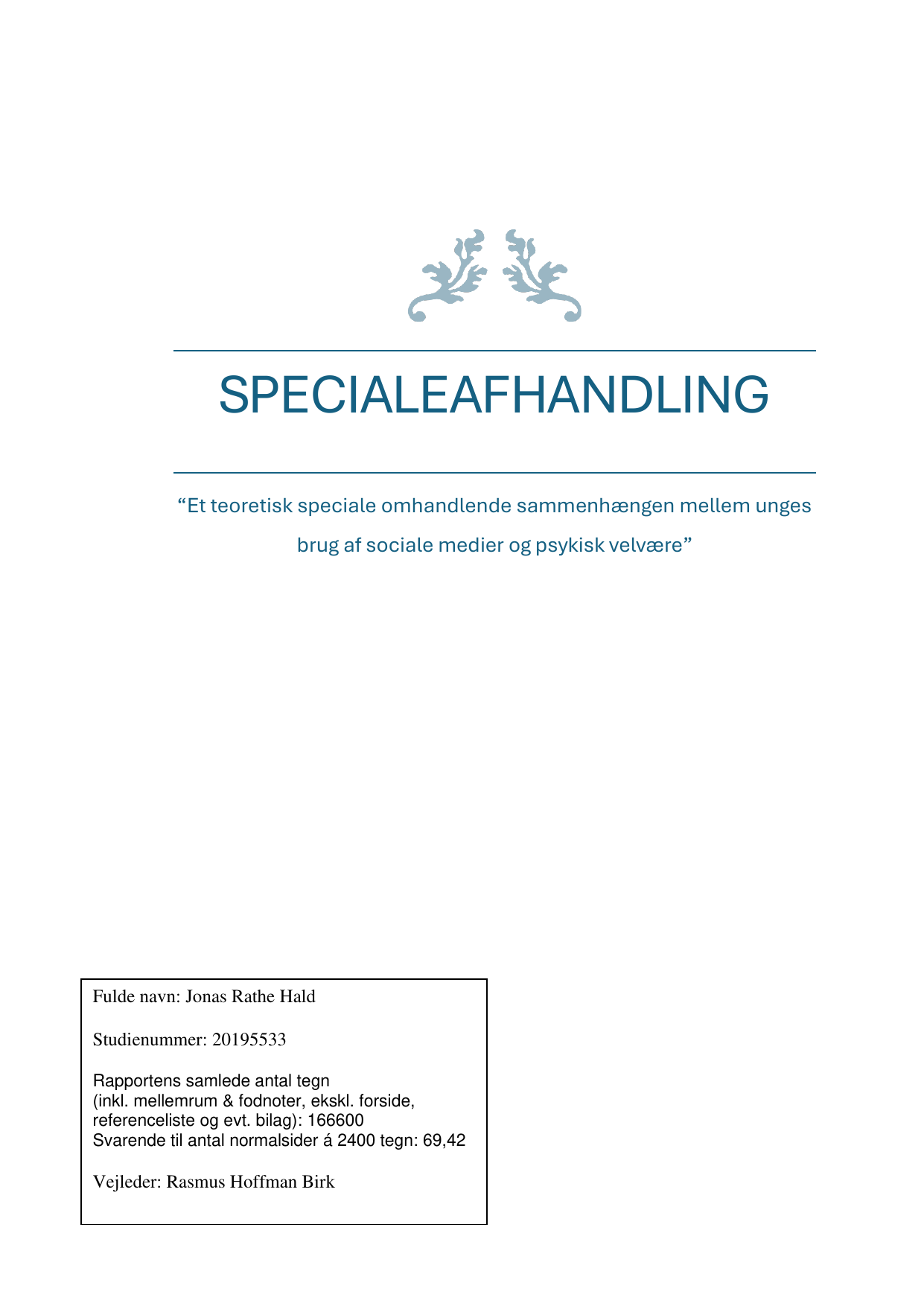
Et teoretisk speciale omhandlende sammenhængen mellem unges brug af sociale medier og psykisk velvære
Oversat titel
A theoretical thesis on the link between young people's social media use and psychological well-being
Forfatter
Semester
4. semester
Uddannelse
Udgivelsesår
2024
Afleveret
2024-05-29
Antal sider
69
Abstract
In this master´s thesis, I seek to make a theoretical examination of the link between social media use and psychological well-being. Many and especially young people use social media daily, and often social media is blamed for having a pernicious impact on mental health. This conclusion is based on mainly quantitative data which shows that there is some sort of correlation between the two variables. Still, it remains unclear what exactly causes the harm, and this serves as the main inspiration for this master´s thesis. As a structural guidance, I follow Bertelsen's (2000) model of common psychology which consists of three levels of psychology: low-level psychology, middle-level psychology, and high-level psychology. Broadly speaking, low-level psychology clarifies to what extent humans are biological creatures, middle-level psychology explains cognitive awareness and how people experience, and high-level psychology illustrates how people´s actions partly are guided by cultural influences. As a result, I develop a theoretical model that combines all three levels of psychology and gives an overall theoretical explanation of the link between social media use and psychological well-being. In addition, I examine why especially young people are affected by social media use. Among low-level psychological theories, I include three theories. First, I take the belongingness hypothesis into account. This is an evolutionary theory that mainly gives an impression on what basis humans are social creatures, which clarifies why people use social media in the first place. Despite explaining what motivates people to use social media, I employ the two low-level psychological theories incentive salience theory and dual system theory to state for what reasons the use of social media can be compulsive for some people. This has shown to be an important aspect of how the use of social media can have a negative influence on psychological well-being and especially young people experience that the compulsive use of social media interferes with reaching educational goals. Next, I apply the attachment theory and narrative identity theory as middle-level psychological theories. Relating to the attachment theory, I investigate on what basis people might experience negative affect while using social media. Secondly, I show how narrative identity theory can explain that people actively experience different episodes on social media, which can influence identity formation. In this regard, I focus on how people can experience that other social media users perform better in several aspects of life which in turn can influence psychological well-being negatively. Following high-level psychology, I employ two theories. First, the social comparison theory is used to explain how cultural ideas affect the way people compare each other on social media. In this regard, I argue that culture inevitably influences the ideals that guide the way people compare themselves with others. Secondly, the theory of cultural tightness-looseness is applied to explain how social media not only is used because of internal demands but also is affected by external normative pressure. Here I argue that mainly people from collectivistic cultures are expected to dedicate a larger amount of time trying to adapt to normative expectations which therefore might result in excessive social media use. Lastly, I try to relate to and discuss three key premises that I follow throughout the thesis. This includes a scientific-theoretical discussion on challenges associated with Bertelsen´s conception of common psychology, a discussion regarding challenges conceptualizing psychological mental states with psychological terms, and lastly, a discussion on to what extend the term “social media” is suitable for the scientific investigation.
Emneord
